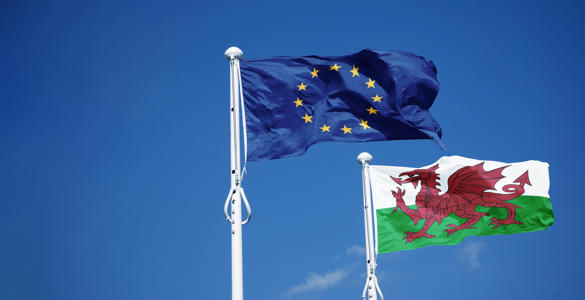It’s been three years since the UK and EU agreed the terms of their future relationship in the Trade and Cooperation Agreement (TCA). It hasn’t been a settled period with continued negotiation and discussion between the two sides.
The UK and EU are now both optimistic that recent developments have moved the relationship into a more positive space. These include agreement on the Windsor Framework and the UK’s association to Horizon Europe and other EU research programmes.
A review of the TCA’s implementation is due by May 2026. The Senedd’s Legislation, Justice and Constitution Committee says that the more positive atmosphere and period of review is an opportunity for Wales to set out clear priorities for its future relationship with the EU that “should not be lost”.
This article looks at how the Committee thinks Wales should prepare for the period ahead.
An opportune moment
Professor Simon Usherwood says that, as the new relationship begins to settle and be accepted:
we’re now in a phase where there needs to be really active thought about how to best input Welsh priorities and preferences into that process. So at a point where the London Government has maybe tuned the page or a page, I think there are lots of opportunities for the Senedd and Wales.
The Committee agree and says Wales should be prepared.
Wales needs to set out clear priorities
The Welsh Government does not have a dedicated EU or Europe strategy and its International Strategy pre-dates Brexit.
The Committee found that there is a clear desire in Wales and the EU for the Welsh Government to set out its priorities for the future UK-EU relationship.
Stakeholders say this would allow organisations to focus limited resources around clear priorities for Wales. Tom Jones of the WCVA says that Wales “can’t just turn up once a year and expect to have an influence”. Dr Elin Royles says that a clear strategy would make it easier to inform UK and EU positions on priority areas for Wales.
The First Minister set out some of the Welsh Government’s priorities in evidence to the Committee but rejected calls for a dedicated EU strategy.
Strategic priorities and a “clear vision for the future” are needed the Committee says. This echoes calls made by the Senedd’s Culture and International Relations Committee in its annual report.
Engagement with civil society on strategic priorities should start immediately
The Committee says that civil society in Wales, the UK and the EU ‘plays a vitally important role’ in the UK-EU relationship. The Committee heard that in Brussels and Northern Ireland, civil society organisations identified solutions to practical barriers created by the new relationship and provided the evidence needed for both sides to agree change.
Civil society organisations in Wales have called for the Welsh Government and Senedd to better coordinate and support input from the sector. The WCVA and Wales Civil Society Forum on Brexit called for the Welsh Government to convene a new advisory group on UK-EU relations. The Committee backs this call and says the Welsh Government should begin immediate engagement with civil society on its priorities for the future relationship. It says civil society engagement in the TCA should be properly resourced by the UK and Welsh governments.
Decisions need to be transparent
Most decisions on how the UK-EU agreements operate in practice take place within complex governance structures with little or no scrutiny until decisions are announced. Professor Catherine Barnard says that the current UK-EU structures have the transparency of a ‘black-box’.
The Committee says that urgent action is needed to improve the transparency of these structures by both the UK Government and the European Commission.
It says greater transparency will provide opportunities for stakeholders, parliamentarians and citizens to know what is happening and have a say on the decisions being made.
Wales should advocate for a greater role in decision making
Professor Elin Royles says the role of the Welsh Government in shaping UK positions on UK-EU matters has diminished post-Brexit.
She said that interministerial group meetings on UK-EU relations between the UK Government and devolved governments have become places where they argue about what role the governments should have in decision making rather than places where positions on key policy areas like trade are agreed. The Committee says this needs urgent reform.
Professor Tobias Lock identifies that there are several ways that decisions taken by the UK and EU could limit the powers of the Welsh Government and Senedd. He says there is a strong case for Wales to have more of a voice in these decisions.
The Committee says that devolved governments can make a positive contribution to shaping UK decisions on EU issues:
Each of the four governments of the UK have their own expertise and experience that they can bring to the table.
It says that improving engagement would mean the UK Government is “better placed” to put forward the strongest possible position in discussions with the EU.
Evidence submitted by the EU’s Committee of the Regions shows that there is support on the EU’s side for the voices of regions and local authorities to be heard.
The Committee says better engagement with devolved governments, regions in the EU and local authorities on both sides will mean implementation is better informed, avoiding unnecessary costs or delays.
The Committee says the case for a greater role for Wales in decision-making is “compelling”. It supports the Welsh Government’s calls for its role to be enhanced and says it should continue to make the case for a stronger voice for Wales.
Being prepared “will be crucial”
The TCA provides for multiple reviews of its provisions, in whole or in part. Parts of the TCA are also time-limited and must be regularly renegotiated. With an implementation review looming before 2026, the Committee says the Welsh Government “should be prepared” and that the “development of Welsh positions ahead of these milestones will be crucial”.
The Committee makes 23 recommendations for how Wales should get ready. Whether the Welsh Government agrees with these, and what it will do next will be debated next week. You can watch the debate live on Senedd.tv
Regardless of the Government’s response, the Committee’s Chair, Huw Irranca-Davies MS, says it will ‘actively engage’ with organisations in Wales, the UK and EU to take its proposals forward.
Article by Nia Moss, Senedd Research, Welsh Parliament






